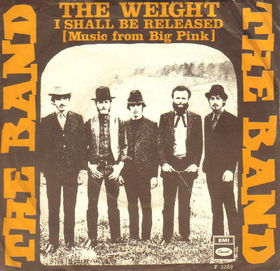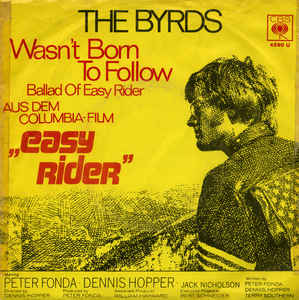
Easy Rider is a 1969 American independent road drama film written by Peter Fonda, Dennis Hopper, and Terry Southern, produced by Fonda, and directed by Hopper. Fonda and Hopper played two bikers who travel through the American Southwest and South, carrying the proceeds from a cocaine deal. The success of Easy Rider helped spark the New Hollywood era of filmmaking during the early 1970s.
Dude is American English slang for an individual, typically male. From the 1870s to the 1960s, dude primarily meant a person who dressed in an extremely fashionable manner or a conspicuous citified person who was visiting a rural location, a "city slicker". In the 1960s, dude evolved to mean any male person, a meaning that slipped into mainstream American slang in the 1970s. Current slang retains at least some use of all three of these common meanings.
Easy rider is an archaic United States slang expression whose meaning has varied with time.

"The Weight" is an original song by the Canadian-American group The Band that was released as Capitol Records single 2269 in 1968 and on the group's debut album Music from Big Pink. Written by Band member Robbie Robertson, the song is about a visitor's experiences in a town mentioned in the lyric's first line as Nazareth. "The Weight" has significantly influenced American popular music, having been listed as No. 41 on Rolling Stone's 500 Greatest Songs of All Time published in 2004. Pitchfork Media named it the 13th best song of the Sixties, and the Rock and Roll Hall of Fame named it one of the 500 Songs that Shaped Rock and Roll. PBS, which broadcast performances of the song in Ramble at the Ryman (2011), Austin City Limits (2012), and Quick Hits (2012), describes it as "a masterpiece of Biblical allusions, enigmatic lines and iconic characters" and notes its enduring popularity as "an essential part of the American songbook."

Ballad of Easy Rider is the eighth album by the American rock band the Byrds and was released in November 1969 on Columbia Records. The album was named after the song "Ballad of Easy Rider", which had been written by the Byrds' guitarist and singer, Roger McGuinn, as the theme song for the 1969 film, Easy Rider. The title was also chosen in an attempt to capitalize on the commercial success of the film, although the majority of the music on the album had no connection with it. Nonetheless, the association with Easy Rider heightened the Byrds' public profile and resulted in Ballad of Easy Rider becoming the band's highest charting album for two years in the U.S.

Easy Rider is the soundtrack to the cult classic 1969 film Easy Rider. The songs that make up the soundtrack were carefully selected to form a "musical commentary" within the film. The album of the soundtrack was released by ABC-Dunhill Records in August 1969. It peaked at #6 on the Billboard album charts in September of that year, and was certified gold in January 1970.

"I Can See for Miles" is a song by the English rock band the Who, recorded for the band's 1967 album The Who Sell Out. Written by guitarist Pete Townshend, it was the only song from the album to be released as a single. It remains the Who's biggest hit single in the US and, after debuting on the Hot 100 at number 72 on 14 October 1967, their only one to reach the Top 10 of the Billboard Hot 100, at number 9 on 25 November – 2 December 1967.
Raybert Productions was a production company that operated in the 1960s, founded by Bob Rafelson and Bert Schneider. Its principal works were the situation comedy The Monkees, and the 1969 movie Easy Rider. Raybert was also the predecessor to BBS Productions, a New Hollywood production company founded by Rafelson, Schneider, and Schneider’s childhood friend Stephen Blauner. BBS Productions' best known film is The Last Picture Show.

Garden State is the soundtrack album to the film Garden State. Compilation producer Zach Braff was awarded a Grammy Award for Best Compilation Soundtrack Album for Motion Pictures, Television or Other Visual Media for his work on the album.

"The Pusher" is a rock song written by Hoyt Axton, made popular by the 1969 movie Easy Rider which used Steppenwolf's version to accompany the opening scenes showing drug trafficking.
Bones are rigid connective members that make up the skeleton of vertebrates.

Advance to the Rear is a light-hearted 1964 American western comedy film set in the American Civil War. Directed by George Marshall, and starring Glenn Ford, Stella Stevens, and Melvyn Douglas. The film is based on the 1957 novel Company of Cowards by Jack Schaefer, whose inspiration was an article by William Chamberlain, published in the Saturday Evening Post in 1956. Chamberlain recounts the apocryphal Civil War stories of "Company Q", a unit composed of coward soldiers who were given a second chance to prove their bravery. The film had the novel title in pre-production and when released in the United Kingdom. However, the novel had none of the comedic elements of the film which retained only the basic idea of a unit formed out of men who had been court-martialed for cowardice and sent out west as well as some character names.
Dirty blues encompasses forms of blues music that deal with socially taboo subjects and obscenity, including sexual acts and/or references to drug use of some kind. Due to the sometimes graphic subject matter, such music was often banned from radio and only available on a jukebox. The style was most popular in the years before World War II, although it had a revival in the 1960s.
"See See Rider", also known as "C.C. Rider", "See See Rider Blues" or "Easy Rider", is a popular American 12-bar blues folk blues song that became a blues and jazz standard. Gertrude "Ma" Rainey was the first to record it on October 16, 1924, at Paramount Records in New York. The song uses mostly traditional blues lyrics to tell the story of an unfaithful lover, commonly called an "easy rider": "See see rider, see what you have done", making a play on the word "see" and the sound of "easy".
"Ballad of Easy Rider" is a song written by Roger McGuinn, with input from Bob Dylan, for the 1969 film, Easy Rider. The song was initially released in August 1969 on the Easy Rider soundtrack album as a Roger McGuinn solo performance. It was later issued in an alternate version as a single by McGuinn's band the Byrds on October 1, 1969. The Byrds' single reached number 65 on the Billboard Hot 100 and was issued in most international territories, although it was not released in the United Kingdom.

"I Wonder Where My Easy Rider's Gone?" is a ragtime/blues song written by Shelton Brooks in 1913. Sometimes categorized as hokum, it led to an answer song written in 1915 by W.C. Handy, "Yellow Dog Rag", later titled "Yellow Dog Blues". Lines and melody from both songs show up in the 1920s and 1930s in such songs as "E. Z. Rider", "See See Rider", "C. C. Rider", and "Easy Rider Blues".

Sonic Free Riders is a motion controlled racing video game developed by Sonic Team and published by Sega exclusively for the Xbox 360. The game requires the use of Microsoft's Kinect peripheral, releasing as a Kinect launch title in November 2010.

Son Lux is an American experimental band. Originally the solo project and moniker of founding member Ryan Lott, the band's first three albums, At War with Walls & Mazes, We Are Rising and Lanterns shaped the band's unique sound through post-rock and electronica influences.

"Wasn't Born to Follow", also known as "I Wasn't Born to Follow", is a song written by Gerry Goffin and Carole King. Goffin wrote the lyrics and King provided the music. The song was first recorded by the Byrds on their 1968 album, The Notorious Byrd Brothers. King's short lived band the City also recorded the song for their 1968 album, Now That Everything's Been Said. It has also been covered by many other artists, including the Monkees, the Lemon Pipers, Dusty Springfield, and as a solo recording by King. The Byrds recording was featured in the 1969 film Easy Rider and was released as a single in the UK and Germany in the same year as a result.











